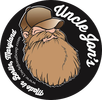Ingredients in our Handmade Soaps
We make our soap completely from scratch, using raw ingredients and recipes we created in a process known as "cold process". This allows us to make small batches that are easier to control and produce a high quality soap.
The ingredients we use to make our handmade soaps vary, depending on the type of soap made. All soaps are made with some kind of fat or oil, some kind of liquid (mostly water) used as a carrier for our lye, and of course sodium hydroxide or 'lye' (potassium hydroxide for liquid soaps). Before you go screaming off into the sunset about lye and it's caustic nature.. let's take a closer look at the soap making process.
There is a saying in the soaper's community that states "you cant have soap without lye!" This is completely true. When a liquid (like water), fats and lye (a strong alkali) are all mixed properly, there is a chemical process called saponification. Hense, the word soap. This is the only way to get true soap. Once this process is complete, you end up with two main products; soap and glycerin. There is also some ammount of water left over but this tends to leave the soap as it cures. And, if the soaper chooses, he (or she) can decide to "superfat" the soap to help create a more conditioning bar for either skin or hair by leaving some extra oil in the recipe at differing proportions. So.. repeat after me.. "there is no lye in finished soap".
Uncle Jon's Handcrafted soaps are made in small batches with all natural ingredients. While there was a lot of guess work and something to do with raw egg back when grandpa used to make soap and figure out lye proportions, we work with specialized charts and a good digital scale to determine the correct proportions of ingredients to use in our soap making process. This allows for a gentle, all natural soap that ends up just the way it was intended... good for the skin and no guesswork!
The ingredients we use to make our handmade soaps vary, depending on the type of soap made. All soaps are made with some kind of fat or oil, some kind of liquid (mostly water) used as a carrier for our lye, and of course sodium hydroxide or 'lye' (potassium hydroxide for liquid soaps). Before you go screaming off into the sunset about lye and it's caustic nature.. let's take a closer look at the soap making process.
There is a saying in the soaper's community that states "you cant have soap without lye!" This is completely true. When a liquid (like water), fats and lye (a strong alkali) are all mixed properly, there is a chemical process called saponification. Hense, the word soap. This is the only way to get true soap. Once this process is complete, you end up with two main products; soap and glycerin. There is also some ammount of water left over but this tends to leave the soap as it cures. And, if the soaper chooses, he (or she) can decide to "superfat" the soap to help create a more conditioning bar for either skin or hair by leaving some extra oil in the recipe at differing proportions. So.. repeat after me.. "there is no lye in finished soap".
Uncle Jon's Handcrafted soaps are made in small batches with all natural ingredients. While there was a lot of guess work and something to do with raw egg back when grandpa used to make soap and figure out lye proportions, we work with specialized charts and a good digital scale to determine the correct proportions of ingredients to use in our soap making process. This allows for a gentle, all natural soap that ends up just the way it was intended... good for the skin and no guesswork!
Other Products
Like our handcrafted soaps, we try to use natural materials in our products when possible. From Soap to beard balm, laundry soap, and shave products... we try to make everything with the least impact to the environment and by hand. Check out our store for all of these great little gems!

